If you’re reading this, chances are a big important question has already crossed your mind. It’s a question millions of young adults all over ask themselves every year: Do I really need college to be successful? Short answer – no. You don’t have to sit in class for four years, take on a mountain of student debt, and hope it all works out for the best. Today, there are more reasons than ever to skip college – and more options than ever to help you succeed without college.
In this post, we’ll give you reasons to rethink college: all the facts about why you shouldn’t feel bad about opting out of college and choosing your own path to success, and give you some practical tips on how to move on and what to do instead.
If you’re in college and you’re thinking about dropping out, read our guide to dropping out of college and landing on your feet.
10 Reasons You Shouldn’t Go to College
Unless you plan to be a doctor or a lawyer or something else that requires specific certifications, there’s a very good chance you can reach your goals faster (and certainly more affordably) by skipping college entirely.
Keep reading to find out why we at Praxis say “You don’t need college to unlock a career you love!”
1. College Is Getting More Expensive
Today, more than 40 U.S. schools charge more than $250,000 for a four-year degree, according to US News and World Report data. And costs are rising for not only tuition and fees but also textbooks and housing, as the chart below shows.
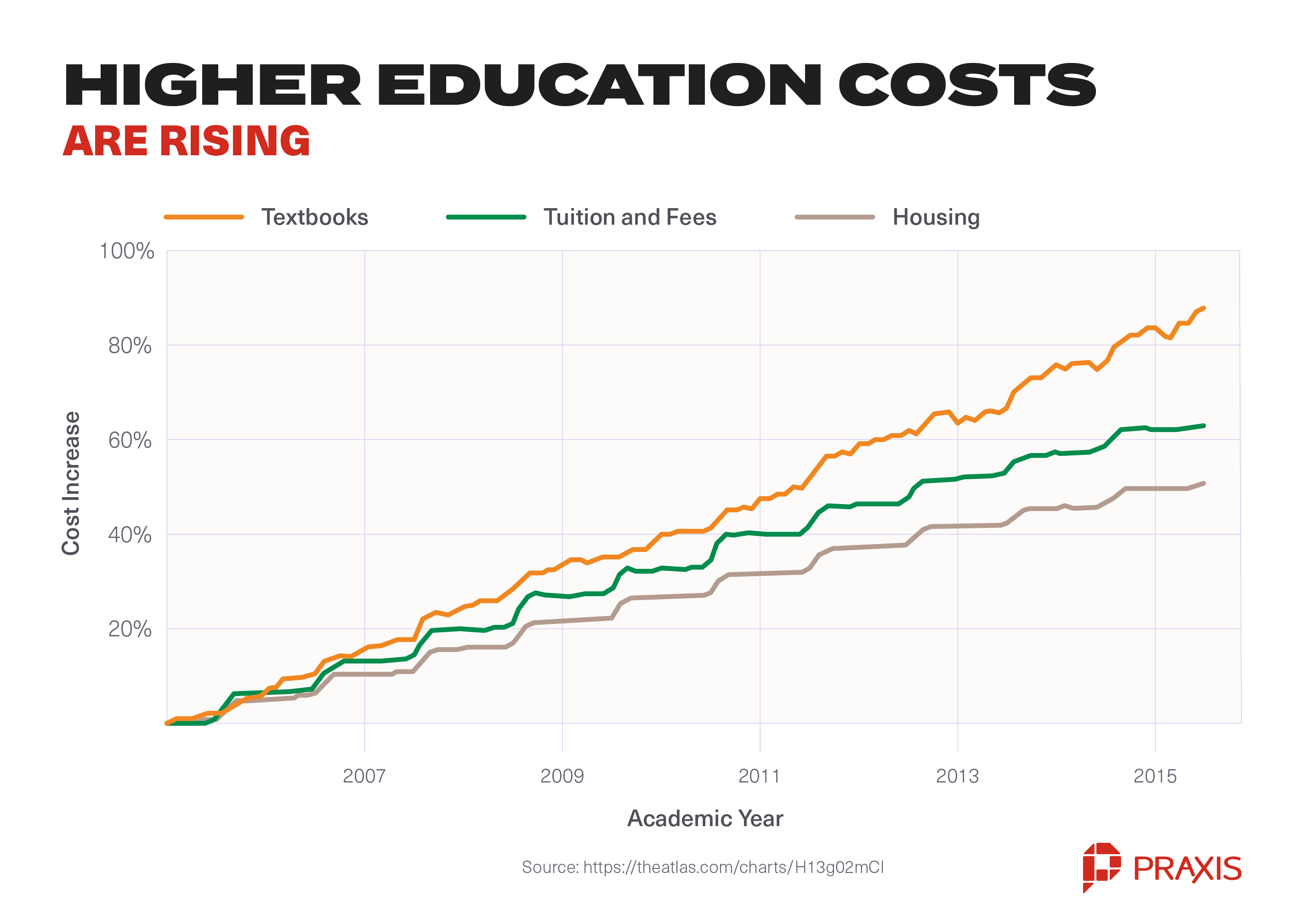
While it’s not impossible to get a degree without racking up a mountain of debt by living at home or going to an in-state public university, many students spend outrageous sums of money chasing the best college and social/networking experience available, which often means spending a lot of money on cross-country flights, gas, and housing.
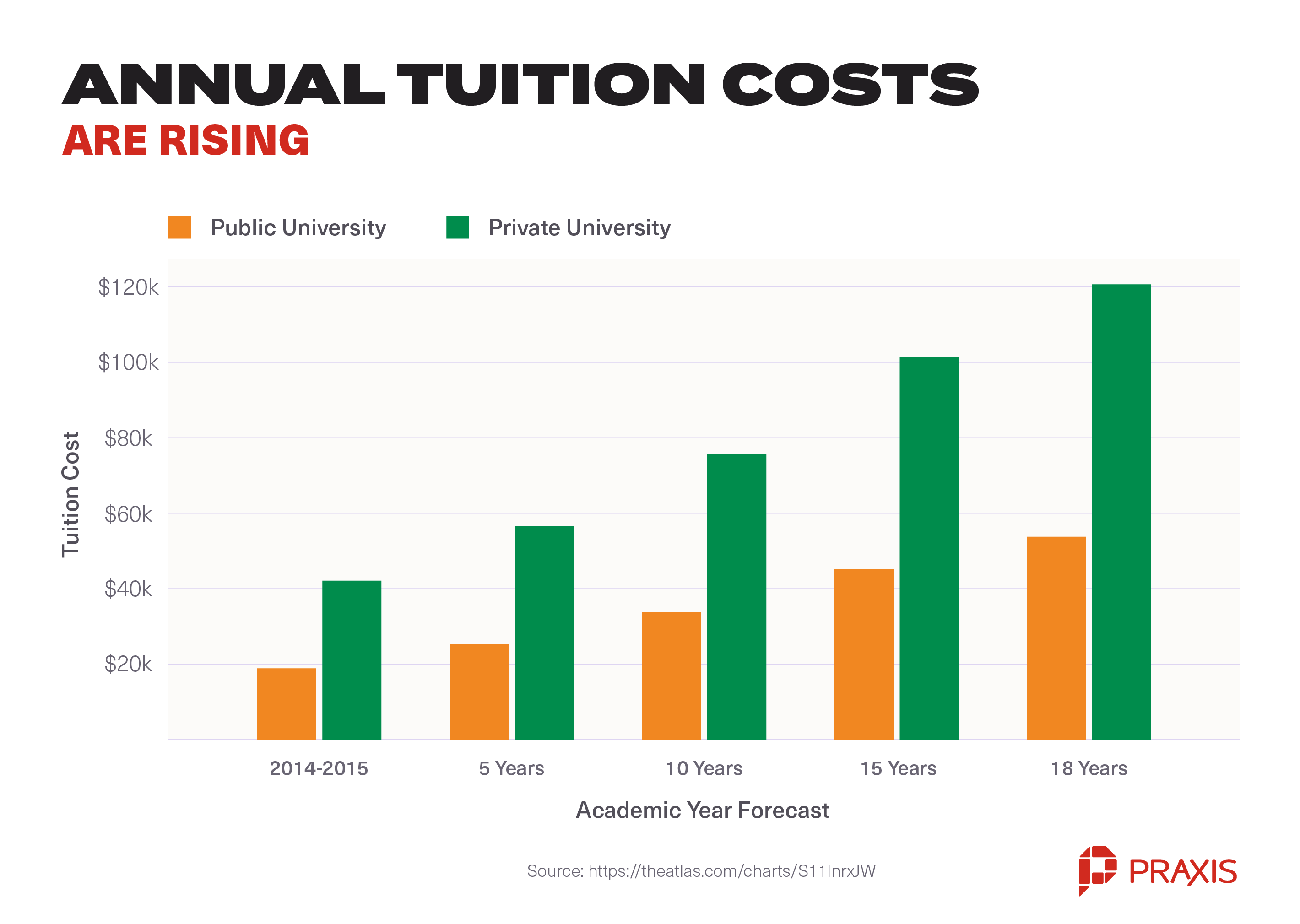
2. College Is Not the Best Route to Entrepreneurship, According to Entrepreneurs
Raised on stories about inspiring entrepreneurs like Gary Vaynerchuck and Elon Musk, a lot of graduates leave school with big dreams of being entrepreneurs. But in the words of many successful entrepreneurs themselves, college is not necessarily the best way to get there.
Instead, set goals for yourself and hold yourself accountable.
Here’s what a few prominent entrepreneurs had to say about college:
Elon Musk, CEO of Tesla and SpaceX:
“You don’t need college to learn stuff. [The value is] seeing whether somebody can work hard at something. […] colleges are basically for fun and to prove you do your chores, but they’re not for learning.”
Steve Jobs, late CEO of Apple:
“I naively chose a college that was almost as expensive as Stanford, and all of my working-class parents’ savings were being spent on my college tuition. After six months, I couldn’t see the value in it. I had no idea what I wanted to do with my life and no idea how college was going to help me figure it out. And here I was spending all of the money my parents had saved their entire life…”
Gary Vaynerchuck, founder of VaynerMedia:
“Entrepreneurship takes execution. You get good at it by “doing.” It’s like tennis. You can read all you want about how to hit the ball, but until you actually start practicing, you’re not going to get any good. You’re not going to find out whether you truly have the talent to be great.”
Grant Cardone, founder of Cardone Capital, a $750 million real estate empire:
“If I could go back in time, I would have skipped it. Time is money. In most cases, I don’t see the value in putting 18-year-olds into massive debt to postpone their career for half a decade […] The Malia Obamas of the world are going to school at Harvard, Yale, and Stanford, not a community college or state university. So if you can’t get into one of the top-notch schools, you would probably do better by skipping college and focusing on real-world skills like closing deals, negotiating, and prospecting.”
Sarah Chrisp, founder of Wholesale Ted:
“Many people told me I would regret that decision; but as an entrepreneur, you don’t need a degree to get chosen for a job. You choose yourself.”
Gail Corder Fischer, executive vice chairman of Fischer & Company:
“If I ever need a brain surgeon, I’ll go to the best I can find. But a degree in business leadership doesn’t make you a great leader; some things are just inherent, or they aren’t.”
Tom Ferry, founder and CEO of Tom Ferry International and New York Times bestselling author of Life! By Design:
“I feel bad for more than half of the young people in college today. I’m not talking about those working toward a specific objective, like becoming a doctor, lawyer, or accountant. I feel sorry for the ones who are trying to “find their path” and racking up massive student loan debt in the process. There are so many ways to learn skills today […] That time would be much better spent experiencing life and seeking mentors in search of your passion. Once you find it, drill down by attending seminars, taking online courses, reading anything and everything relevant, and even bingeing on YouTube videos to become an expert in that area. There’s unlimited information at your fingertips.”
James Altucher, hedge fund manager and successful entrepreneur known for his podcast and as the author of The Power of No:
“I’d rather have a surgeon who did a thousand surgeries operate on me than one who got a random education.”
3. Avoid Student Loan Debt
More than 44 million Americans are saddled with student loan debt. Americans owe some $1.6 trillion in student loans. According to the Institute for College Access and Success, the average student loan debt for members of the class of 2018 sitting at $29,200 – a 2% increase from the previous year.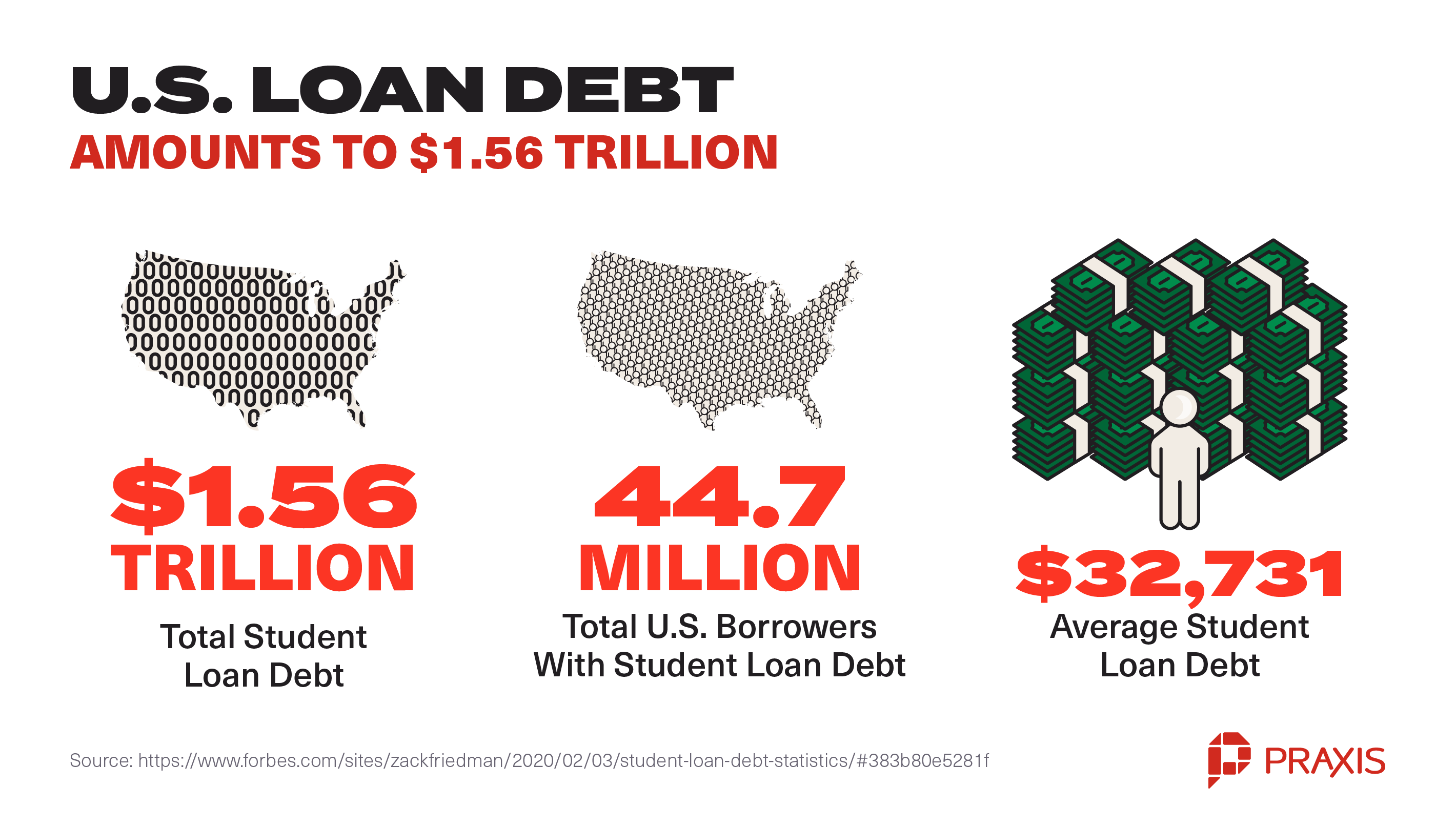
4. You’re Not Alone
You might be under the impression that everyone goes to college, but you’d be mistaken. According to the Washington Examiner, some 68% of Americans don’t have a bachelor’s degree. The undergraduate dropout rate in the U.S. is 40% with around 30% of college students dropping out before sophomore year. So if you do choose to drop out, know that you’re not alone.
5. You’re in Good Company
Dropping out of college is not the career-ender many people make it out to be. In fact, nearly a third of billionaires in 2016 didn’t graduate from college.
Here’s a list of some of the successful college dropouts:
- Steve Jobs, Apple’s late co-founder and CEO
- Brandon Stanton, Author and photographer at Humans of New York
- Mark Zuckerberg, Facebook co-founder and CEO
- Bill Gates, Microsoft co-founder
- Ellen Degeneres, Talkshow host
- Natasha Bedingfield, Singer-songwriter
- Oprah Winfrey, Talkshow host
- Brad Pitt, Actor
- Jack Dorsey, Co-founder of Twitter
- Jan Koum, WhatsApp co-founder
- Scott Fitzgerald, Author
- John Mackey, Whole Foods CEO
- Ralph Lauren, Fashion designer
- Daniel Ek, Co-founder of Spotify
- Ted Turner, Founder of CNN
- Richard Branson, Founder of Virgin
- Travis Kalanick, Founder of Uber
- Lady Gaga, Musician and actress
- David Karp, Tumblr founder and former CEO
Maybe you’re thinking “these celebrity dropouts are outliers, I’m nothing like them!” And the truth is, we only use these examples because they’re famous and everyone knows about them, but there are countless people around the world who dropped out or never went to college whose stories we just don’t know.
You don’t have to be famous to be a success and build a rewarding, engaging career that makes you excited to get out of bed in the morning.
6. The U.S. Education Model Is Flawed
The U.S. is actually unusual in how much it values tertiary education. In other countries, a college education is far from viewed as the only path to a successful career. In Germany, for instance, it’s very common for young people to train as apprentices in fields ranging from banking to manufacturing, to I.T., with around 60 percent of young people taking this route.
Meanwhile, in the U.S., apprenticeships are as low as 5 percent and the occupations that offer trade apprenticeships are mainly associated with construction.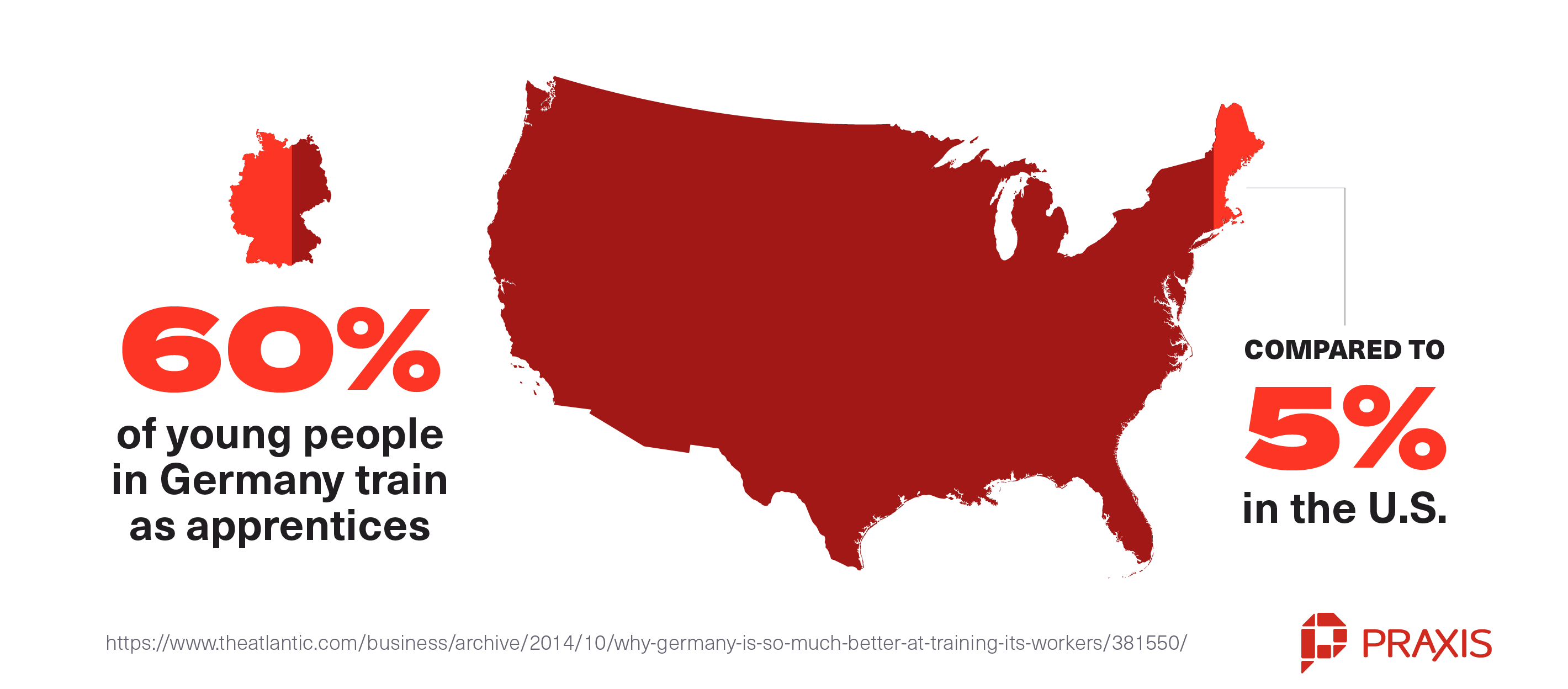
7. Learning Out of Obligation Is Less Valuable Than Following Your Interests
When you talk to people who have been to college, you’ll often hear them say “I wish I’d been a better student” or “I wish I’d waited before going to college” or “If I could do it over, I would have studied X or Y instead.” The problem is that a lot of people simply don’t know themselves well enough when they’re young to choose the best course of study for them. So they only realize much later in life which fields they found truly useful or interesting and would enjoy studying.
There’s no shame in waiting until you have more clarity on what really makes you come alive (and access to funds) before you choose to study. According to research by The Bill and Melinda Gates Foundation, 40 percent of students are over the age of 25, about 28 percent of students have children, and some 62 percent of students must work while studying.
Get some life experience. Figure out what makes you tick. Odds are you’ll never need a degree for your dream job, but if you discover a burning passion for botany or philosophy (or whatever floats your boat) later in life and choose to study it in college, you’ll be doing it because you know you want to, not because society expects you to.
8. A College Degree Is No Longer a Prerequisite for a Good Job
A growing number of high-profile companies are steering away from the practice of listing higher education qualifications in their recruitment requirements.
Here’s a list of top companies that no longer require a college degree:
- Apple
- Tesla
- EY
- Publix
- IBM
- Penguin Random House
- Hilton
- Publix
- Bank of America
Now, you might be thinking “But most of those are all tech companies, and I don’t know how to code!” but the good news is that these high-profile companies make waves that cause ripples through the rest of the job market. While removing degree requirements from job descriptions probably isn’t something you can expect businesses everywhere to adopt overnight, the trend is gaining traction – and driving many companies to rethink their hiring practices.
Not to mention, even when companies list a degree requirement, it’s actually far easier than you might think to bypass this altogether – and land the job offer regardless of your educational background. But that’s another post for another day.
9. You Can Learn (Almost) Anything Online
We’re big proponents of self-directed education. We don’t believe that learning only takes place in the classroom. With the right mindset, every experience can be an opportunity for learning, and if you’re deliberate about it, you can learn everything you need to know to do a job you love without ever setting foot in college.
There are countless online education options available, ranging from free or cheap courses on e-learning platforms like Udemy, Shaw Academy, Domestika, and Coursera, and YouTube tutorials, to Massive Open Online Courses (MOOCs), certified online courses like the Open University.
Beyond ordinary self-driven online courses, there are a variety of online bootcamp options like CodeAcademy if you’re interested in learning how to code, or Praxis for learning practical business skills to equip you for the modern workplace.
10. College Doesn’t Prepare You For Work
While there’s an argument to be made that college can help you start building a network, the sad truth is that a network of mostly people your same age probably won’t start paying dividends for a few years. That aside, an even more startling realization is just how woefully unprepared for the workplace most college students are when they graduate. This is largely because traditional college focuses on theory rather than application. Instead of working on real-world problems or learning how to sell yourself on the job market, students spend their days memorizing textbooks and obscure facts in preparation for tests.
In the real world, you can just assume everything is on the test – everything, that is, except probably what you studied in most of your college courses. Truth be told, employers don’t actually care how much you know – they care about whether or not you can show up, work hard, and bring some skills to the table. And most of those skills aren’t taught in classrooms today.
Here are the business skills in highest demand in 2020, according to LinkedIn: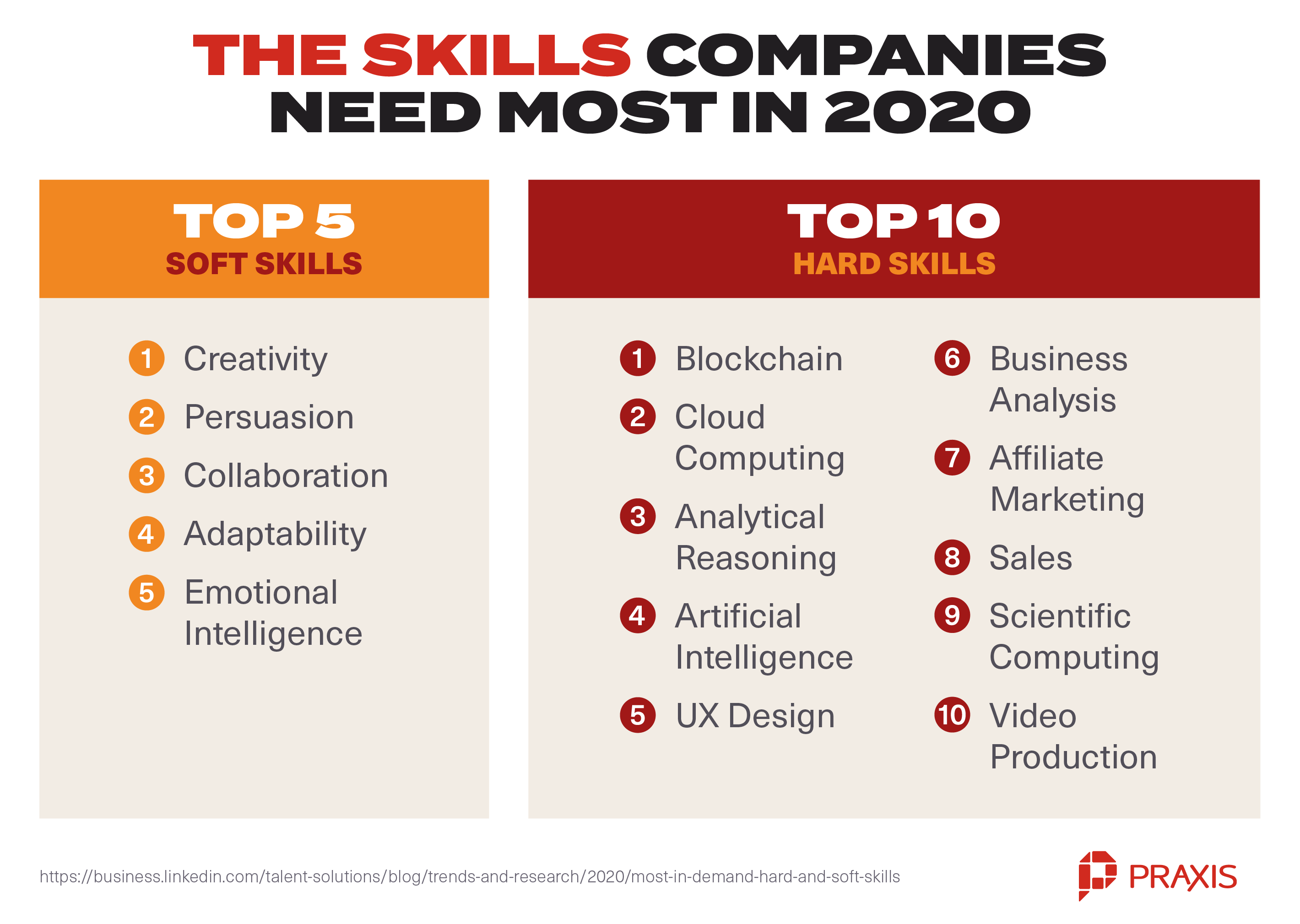
Sure, some of these hard skills are technical, but a fair number of them (analytical reasoning, business analysis, affiliate marketing, sales, and video production) can be learned on the job if you apply yourself.
Quite often, employers actually care more about soft skills than hard skills, because it’s easier to teach someone hard skills with training than it is to teach someone how to be creative or adaptable. So don’t neglect to sharpen your soft skills too!
Don’t Go to College: What to Do Instead
If you’ve decided to skip college, good for you. But unless you already have a specific goal and plan in mind, you’re probably wondering what to do now. There’s a widespread misconception that if you don’t go to college, you’ll end up working in the retail or service industry for the rest of your life – but that’s simply not true. If you’re driven, curious, and creative, you can build a lucrative career and a life you love – yes, without a degree.
Invest In Yourself
The most important thing you can do is make a decision to invest in yourself. What does this mean? It means choosing to be curious and proactive about building yourself up by developing your skills and exploring new opportunities that will teach you more about yourself, specific skills that could come in handy, and the business world in general.
Having sought-after skills, demonstrable professional capabilities, a broad network, and varied work experience mean you have choices. But even more importantly, collecting a variety of experiences early in life will teach you what kind of work energizes and excites you, and what frustrates and exhausts you. This is key to figuring out what kind of job will make you happy in the long run, because nobody should have to do a job they hate.
Don’t go to college and you’ll have a four-year head start discovering what kind of life you want – not to mention a variety of skills employers find valuable.
To help you collect experiences and skills that will help you forge your own path, here’s a list of our 10 top college alternatives for 2020.
Top 10 College Alternatives
- Take online courses
- Monetize your hobby
- Do an apprenticeship
- Go to community college
- Enroll in a coding bootcamp
- Start a business
- Join an accelerator
- Get a job
- Move away from your hometown
- Enroll in Praxis, the ultimate college alternative
Read the full post here: The Best Alternatives to College for 2023 and Beyond.
Discover Praxis
We get it. Choosing to skip college is a big decision. Odds are, you’ve felt some pressure to get a degree, because, for a long time, the prevailing school of thought has been that you need that credential in order to make a decent living.
While that may have been true a generation or two ago, it’s simply not the case anymore. There are many different routes to success, as long as you’re hungry for it and willing to do the work to get there.
At Praxis, we believe you deserve something different from college. Something that helps you get ahead for good – without taking precious years off your life and unthinkable financial risk. A program that puts you in the driver’s seat of your life and career – and that stands 100% behind your results. And that’s exactly why we’ve designed our program the way we have.
Our goal is to reduce the unnecessary hoop-jumping required to start your life – to shorten the distance between learning and earning – and to offer you the most direct, effective path possible into the real world. We do that through our 12-month program that combines six months of accelerated practical learning with real-world, paid work experience, accompanied by ongoing coaching and mentoring.
And we’re so confident in the results you’ll have following our process that we’ve backed it with a full-guarantee and the option to wait to pay until you’re hired and earning an income. Because we believe our success should be directly tied to yours.
September 4, 2020
